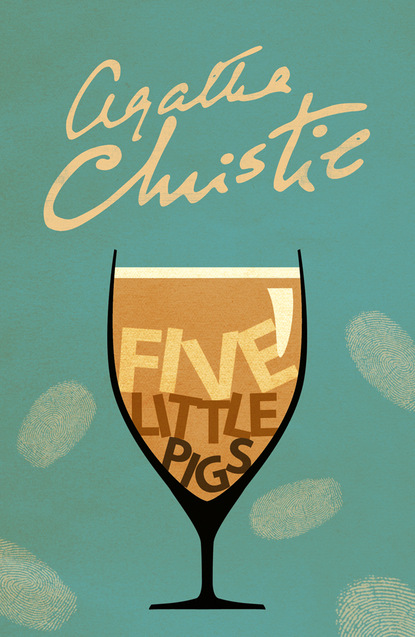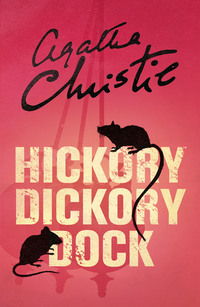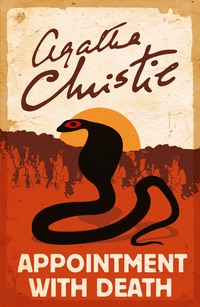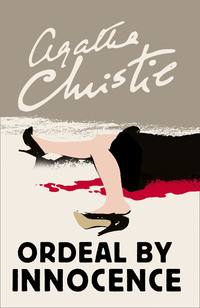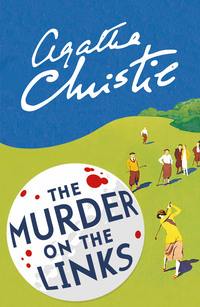
Полная версия
Peril at End House
‘And your father?’
‘He was invalided home from the War, then got pneumonia and died in 1919. My mother died when I was a baby. I lived here with grandfather. He and Dad didn’t get on (I don’t wonder), so Dad found it convenient to park me and go roaming the world on his own account. Gerald—that was my brother—didn’t get on with grandfather either. I dare say I shouldn’t have got on with him if I’d been a boy. Being a girl saved me. Grandfather used to say I was a chip off the old block and had inherited his spirit.’ She laughed. ‘He was an awful old rip, I believe. But frightfully lucky. There was a saying round here that everything he touched turned to gold. He was a gambler, though, and gambled it away again. When he died he left hardly anything beside the house and land. I was sixteen when he died and Gerald was twenty-two. Gerald was killed in a motor accident just three years ago and the place came to me.’
‘And after you, Mademoiselle? Who is your nearest relation?’
‘My cousin, Charles. Charles Vyse. He’s a lawyer down here. Quite good and worthy but very dull. He gives me good advice and tries to restrain my extravagant tastes.’
‘He manages your affairs for you—eh?’
‘Well—yes, if you like to put it that way. I haven’t many affairs to manage. He arranged the mortgage for me and made me let the lodge.’
‘Ah!—the lodge. I was going to ask you about that. It is let?’
‘Yes—to some Australians. Croft their name is. Very hearty, you know—and all that sort of thing. Simply oppressively kind. Always bringing up sticks of celery and early peas and things like that. They’re shocked at the way I let the garden go. They’re rather a nuisance, really—at least he is. Too terribly friendly for words. She’s a cripple, poor thing, and lies on a sofa all day. Anyway they pay the rent and that’s the great thing.’
‘How long have they been here?’
‘Oh! about six months.’
‘I see. Now, beyond this cousin of yours—on your father’s side or your mother’s, by the way?’
‘Mother’s. My mother was Amy Vyse.’
‘Bien! Now, beyond this cousin, as I was saying, have you any other relatives?’
‘Some very distant cousins in Yorkshire—Buckleys.’
‘No one else?’
‘No.’
‘That is lonely.’
Nick stared at him.
‘Lonely? What a funny idea. I’m not down here much, you know. I’m usually in London. Relations are too devastating as a rule. They fuss and interfere. It’s much more fun to be on one’s own.’
‘I will not waste the sympathy. You are a modern, I see, Mademoiselle. Now—your household.’
‘How grand that sounds! Ellen’s the household. And her husband, who’s a sort of gardener—not a very good one. I pay them frightfully little because I let them have the child here. Ellen does for me when I’m down here and if I have a party we get in who and what we can to help. I’m giving a party on Monday. It’s Regatta week, you know.’
‘Monday—and today is Saturday. Yes. Yes. And now, Mademoiselle, your friends—the ones with whom you were lunching today, for instance?’
‘Well, Freddie Rice—the fair girl—is practically my greatest friend. She’s had a rotten life. Married to a beast—a man who drank and drugged and was altogether a queer of the worst description. She had to leave him a year or two ago. Since then she’s drifted round. I wish to goodness she’d get a divorce and marry Jim Lazarus.’
‘Lazarus? The art dealer in Bond Street?’
‘Yes. Jim’s the only son. Rolling in money, of course. Did you see that car of his? He’s a Jew, of course, but a frightfully decent one. And he’s devoted to Freddie. They go about everywhere together. They are staying at the Majestic over the week-end and are coming to me on Monday.’
‘And Mrs Rice’s husband?’
‘The mess? Oh! he’s dropped out of everything. Nobody knows where he is. It makes it horribly awkward for Freddie. You can’t divorce a man when you don’t know where he is.’
‘Évidemment!’
‘Poor Freddie,’ said Nick, pensively. ‘She’s had rotten luck. The thing was all fixed once. She got hold of him and put it to him, and he said he was perfectly willing, but he simply hadn’t got the cash to take a woman to a hotel. So the end of it all was she forked out—and he took it and off he went and has never been heard of from that day to this. Pretty mean, I call it.’
‘Good heavens,’ I exclaimed.
‘My friend Hastings is shocked,’ remarked Poirot. ‘You must be more careful, Mademoiselle. He is out of date, you comprehend. He has just returned from those great clear open spaces, etc., and he has yet to learn the language of nowadays.’
‘Well, there’s nothing to get shocked about,’ said Nick, opening her eyes very wide. ‘I mean, everybody knows, don’t they, that there are such people. But I call it a low-down trick all the same. Poor old Freddie was so damned hard up at the time that she didn’t know where to turn.’
‘Yes, yes, not a very pretty affair. And your other friend, Mademoiselle. The good Commander Challenger?’
‘George? I’ve known George all my life—well, for the last five years anyway. He’s a good scout, George.’
‘He wishes you to marry him—eh?’
‘He does mention it now and again. In the small hours of the morning or after the second glass of port.’
‘But you remain hard-hearted.’
‘What would be the use of George and me marrying one another? We’ve neither of us got a bean. And one would get terribly bored with George. That “playing for one’s side,” “good old school” manner. After all, he’s forty if he’s a day.’
The remark made me wince slightly.
‘In fact he has one foot in the grave,’ said Poirot. ‘Oh! do not mind me, Mademoiselle. I am a grandpapa—a nobody. And now tell me more about these accidents. The picture, for instance?’
‘It’s been hung up again—on a new cord. You can come and see it if you like.’
She led the way out of the room and we followed her. The picture in question was an oil painting in a heavy frame. It hung directly over the bed-head.
With a murmured, ‘You permit, Mademoiselle,’ Poirot removed his shoes and mounted upon the bed. He examined the picture and the cord, and gingerly tested the weight of the painting. With an elegant grimace he descended.
‘To have that descend on one’s head—no, it would not be pretty. The cord by which it was hung, Mademoiselle, was it, like this one, a wire cable?’
‘Yes, but not so thick. I got a thicker one this time.’
‘That is comprehensible. And you examined the break—the edges were frayed?’
‘I think so—but I didn’t notice particularly. Why should I?’
‘Exactly. As you say, why should you? All the same, I should much like to look at that piece of wire. Is it about the house anywhere?’
‘It was still on the picture. I expect the man who put the new wire on just threw the old one away.’
‘A pity. I should like to have seen it.’
‘You don’t think it was just an accident after all? Surely it couldn’t have been anything else.’
‘It may have been an accident. It is impossible to say. But the damage to the brakes of your car—that was not an accident. And the stone that rolled down the cliff—I should like to see the spot where that accident occurred.’
Nick took us out in the garden and led us to the cliff edge. The sea glittered blue below us. A rough path led down the face of the rock. Nick described just where the accident occurred and Poirot nodded thoughtfully. Then he asked:
‘How many ways are there into your garden, Mademoiselle?’
‘There’s the front way—past the lodge. And a tradesman’s entrance—a door in the wall half-way up that lane. Then there’s a gate just along here on the cliff edge. It leads out on to a zig zag path that leads up from that beach to the Majestic Hotel. And then, of course, you can go straight through a gap in the hedge into the Majestic garden—that’s the way I went this morning. To go through the Majestic garden is a short cut to the town anyway.’
‘And your gardener—where does he usually work?’
‘Well, he usually potters round the kitchen garden, or else he sits in the potting-shed and pretends to be sharpening the shears.’
‘Round the other side of the house, that is to say?’
‘So that if anyone were to come in here and dislodge a boulder he would be very unlikely to be noticed.’
Nick gave a sudden little shiver.
‘Do you—do you really think that is what happened?’ she asked, ‘I can’t believe it somehow. It seems so perfectly futile.’
Poirot drew the bullet from his pocket again and looked at it.
‘That was not futile, Mademoiselle,’ he said gently.
‘It must have been some madman.’
‘Possibly. It is an interesting subject of after-dinner conversation—are all criminals really madmen? There may be a malformation in their little grey cells—yes, it is very likely. That, it is the affair of the doctor. For me—I have different work to perform. I have the innocent to think of, not the guilty—the victim, not the criminal. It is you I am considering now, Mademoiselle, not your unknown assailant. You are young and beautiful, and the sun shines and the world is pleasant, and there is life and love ahead of you. It is all that of which I think, Mademoiselle. Tell me, these friends of yours, Mrs Rice and Mr Lazarus—they have been down here, how long?’
‘Freddie came down on Wednesday to this part of the world. She stopped with some people near Tavistock for a couple of nights. She came on here yesterday. Jim has been touring round about, I believe.’
‘And Commander Challenger?’
‘He’s at Devonport. He comes over in his car whenever he can—week-ends mostly.’
Poirot nodded. We were walking back to the house. There was a silence, and then he said suddenly:
‘Have you a friend whom you can trust, Mademoiselle?’
‘There’s Freddie.’
‘Other than Mrs Rice.’
‘Well, I don’t know. I suppose I have. Why?’
‘Because I want you to have a friend to stay with you—immediately.’
‘Oh!’
Nick seemed rather taken aback. She was silent a moment or two, thinking. Then she said doubtfully:
‘There’s Maggie. I could get hold of her, I expect.’
‘Who is Maggie?’
‘One of my Yorkshire cousins. There’s a large family of them. He’s a clergyman, you know. Maggie’s about my age, and I usually have her to stay sometime or other in the summer. She’s no fun, though—one of those painfully pure girls, with the kind of hair that has just become fashionable by accident. I was hoping to get out of having her this year.’
‘Not at all. Your cousin, Mademoiselle, will do admirably. Just the type of person I had in mind.’
‘All right,’ said Nick, with a sigh. ‘I’ll wire her. I certainly don’t know who else I could get hold of just now. Everyone’s fixed up. But if it isn’t the Choirboys’ Outing or the Mothers’ Beanfeast she’ll come all right. Though what you expect her to do…’
‘Could you arrange for her to sleep in your room?’
‘I suppose so.’
‘She would not think that an odd request?’
‘Oh, no, Maggie never thinks. She just does—earnestly, you know. Christian works—with faith and perseverance. All right, I’ll wire her to come on Monday.’
‘Why not tomorrow?’
‘With Sunday trains? She’ll think I’m dying if I suggest that. No, I’ll say Monday. Are you going to tell her about the awful fate hanging over me?’
‘Nous verrons. You still make a jest of it? You have courage, I am glad to see.’
‘It makes a diversion anyway,’ said Nick.
Something in her tone struck me and I glanced at her curiously. I had a feeling that there was something she had left untold. We had re-entered the drawing-room. Poirot was fingering the newspaper on the sofa.
‘You read this, Mademoiselle?’ he asked, suddenly.
‘The St Loo Herald? Not seriously. I opened it to see the tides. It gives them every week.’
‘I see. By the way, Mademoiselle, have you ever made a will?’
‘Yes, I did. About six months ago. Just before my op.’
‘Qu’est ce que vous dites? Your op?’
‘Operation. For appendicitis. Someone said I ought to make a will, so I did. It made me feel quite important.’
‘And the terms of that will?’
‘I left End House to Charles. I hadn’t much else to leave, but what there was I left to Freddie. I should think probably the—what do you call them—liabilities would have exceeded the assets, really.’
Poirot nodded absently.
‘I will take my leave now. Au revoir, Mademoiselle. Be careful.’
‘What of?’ asked Nick.
‘You are intelligent. Yes, that is the weak point—in which direction are you to be careful? Who can say? But have confidence, Mademoiselle. In a few days I shall have discovered the truth.’
‘Until then beware of poison, bombs, revolver shots, motor accidents and arrows dipped in the secret poison of the South American Indians,’ finished Nick glibly.
‘Do not mock yourself, Mademoiselle,’ said Poirot gravely.
He paused as he reached the door.
‘By the way,’ he said. ‘What price did M. Lazarus offer you for the portrait of your grandfather?’
‘Fifty pounds.’
‘Ah!’ said Poirot.
He looked earnestly back at the dark saturnine face above the mantelpiece.
‘But, as I told you, I don’t want to sell the old boy.’
‘No,’ said Poirot, thoughtfully. ‘No, I understand.’
CHAPTER 4
There Must Be Something!
‘Poirot,’ I said, as soon as we were out upon the road. ‘There is one thing I think you ought to know.’
‘And what is that, mon ami?’
I told him of Mrs Rice’s version of the trouble with the motor.
‘Tiens! C’est intéressant, ça. There is, of course, a type, vain, hysterical, that seeks to make itself interesting by having marvellous escapes from death and which will recount to you surprising histories that never happened! Yes, it is well known, that type there. Such people will even do themselves grave bodily injury to sustain the fiction.’
‘You don’t think that—’
‘That Mademoiselle Nick is of that type? No, indeed. You observed, Hastings, that we had great difficulty in convincing her of her danger. And right to the end she kept up the farce of a half-mocking disbelief. She is of her generation, that little one. All the same, it is interesting—what Madame Rice said. Why should she say it? Why say it even if it were true? It was unnecessary—almost gauche.’
‘Yes,’ I said. ‘That’s true. She dragged it into the conversation neck and crop—for no earthly reason that I could see.’
‘That is curious. Yes, that is curious. The little facts that are curious, I like to see them appear. They are significant. They point the way.’
‘The way—where?’
‘You put your finger on the weak spot, my excellent Hastings. Where? Where indeed! Alas, we shall not know till we get there.’
‘Tell me, Poirot,’ I said. ‘Why did you insist on her getting this cousin to stay?’
Poirot stopped and waved an excited forefinger at me.
‘Consider,’ he cried. ‘Consider for one little moment, Hastings. How are we handicapped! How are our hands tied! To hunt down a murderer after a crime has been committed—c’est tout simple! Or at least it is simple to one of my ability. The murderer has, so to speak, signed his name by committing the crime. But here there is no crime—and what is more we do not want a crime. To detect a crime before it has been committed—that is indeed of a rare difficulty.
‘What is our first aim? The safety of Mademoiselle. And that is not easy. No, it is not easy, Hastings. We cannot watch over her day and night—we cannot even send a policeman in big boots to watch over her. We cannot pass the night in a young lady’s sleeping chamber. The affair bristles with difficulties.
‘But we can do one thing. We can make it more difficult for our assassin. We can put Mademoiselle upon her guard and we can introduce a perfectly impartial witness. It will take a very clever man to get round those two circumstances.’
He paused, and then said in an entirely different tone of voice:
‘But what I am afraid of, Hastings—’
‘Yes?’
‘What I am afraid of is—that he is a very clever man. And I am not easy in my mind. No, I am not easy at all.’
‘Poirot,’ I said. ‘You’re making me feel quite nervous.’
‘So am I nervous. Listen, my friend, that paper, the St Loo Weekly Herald. It was open and folded back at—where do you think? A little paragraph which said, “Among the guests staying at the Majestic Hotel are M. Hercule Poirot and Captain Hastings.” Supposing—just supposing that someone had read that paragraph. They know my name—everyone knows my name—’
‘Miss Buckley didn’t,’ I said, with a grin.
‘She is a scatterbrain—she does not count. A serious man—a criminal—would know my name. And he would be afraid! He would wonder! He would ask himself questions. Three times he has attempted the life of Mademoiselle and now Hercule Poirot arrives in the neighbourhood. “Is that coincidence?” he would ask himself. And he would fear that it might not be coincidence. What would he do then?’
‘Lie low and hide his tracks,’ I suggested.
‘Yes—yes—or else—if he had real audacity, he would strike quickly—without loss of time. Before I had time to make inquiries—pouf, Mademoiselle is dead. That is what a man of audacity would do.’
‘But why do you think that somebody read that paragraph other than Miss Buckley?’
‘It was not Miss Buckley who read that paragraph. When I mentioned my name it meant nothing to her. It was not even familiar. Her face did not change. Besides she told us—she opened the paper to look at the tides—nothing else. Well, there was no tide table on that page.’
‘You think someone in the house—’
‘Someone in the house or who has access to it. And that last is easy—the window stands open. Without doubt Miss Buckley’s friends pass in and out.’
‘Have you any idea? Any suspicion?’
Poirot flung out his hands.
‘Nothing. Whatever the motive, it is, as I predicted, not an obvious one. That is the would-be murderer’s security—that is why he could act so daringly this morning. On the face of it, no one seems to have any reason for desiring the little Nick’s death. The property? End House? That passes to the cousin—but does he particularly want a heavily mortgaged and very dilapidated old house? It is not even a family place so far as he is concerned. He is not a Buckley, remember. We must see this Charles Vyse, certainly, but the idea seems fantastic.
‘Then there is Madame—the bosom friend—with her strange eyes and her air of a lost Madonna—’
‘You felt that too?’ I asked, startled.
‘What is her concern in the business? She tells you that her friend is a liar. C’est gentille, ça! Why does she tell you? Is she afraid of something that Nick may say? Is that something connected with the car? Or did she use that as an instance, and was her real fear of something else? Did anyone tamper with the car, and if so, who? And does she know about it?
‘Then the handsome blond, M. Lazarus. Where does he fit in? With his marvellous automobile and his money. Can he possibly be concerned in any way? Commander Challenger—’
‘He’s all right,’ I put in quickly. ‘I’m sure of that. A real pukka sahib.’
‘Doubtless he has been to what you consider the right school. Happily, being a foreigner, I am free from these prejudices, and can make investigations unhampered by them. But I will admit that I find it hard to connect Commander Challenger with the case. In fact, I do not see that he can be connected.’
‘Of course he can’t,’ I said warmly.
Poirot looked at me meditatively.
‘You have an extraordinary effect on me, Hastings. You have so strongly the flair in the wrong direction that I am almost tempted to go by it! You are that wholly admirable type of man, honest, credulous, honourable, who is invariably taken in by any scoundrel. You are the type of man who invests in doubtful oil fields, and non-existent gold mines. From hundreds like you, the swindler makes his daily bread. Ah, well—I shall study this Commander Challenger. You have awakened my doubts.’
‘My dear Poirot,’ I cried, angrily. ‘You are perfectly absurd. A man who has knocked about the world like I have—’
‘Never learns,’ said Poirot, sadly. ‘It is amazing—but there it is.’
‘Do you suppose I’d have made a success of my ranch out in the Argentine if I were the kind of credulous fool you make out?’
‘Do not enrage yourself, mon ami. You have made a great success of it—you and your wife.’
‘Bella,’ I said, ‘always goes by my judgement.’
‘She is as wise as she is charming,’ said Poirot. ‘Let us not quarrel my friend. See, there ahead of us, it says Mott’s Garage. That, I think, is the garage mentioned by Mademoiselle Buckley. A few inquiries will soon give us the truth of that little matter.’
We duly entered the place and Poirot introduced himself by explaining that he had been recommended there by Miss Buckley. He made some inquiries about hiring a car for some afternoon drives and from there slid easily into the topic of the damage sustained by Miss Buckley’s car not long ago.
Immediately the garage proprietor waxed voluble. Most extraordinary thing he’d ever seen. He proceeded to be technical. I, alas, am not mechanically minded. Poirot, I should imagine, is even less so. But certain facts did emerge unmistakably. The car had been tampered with. And the damage had been something quite easily done, occupying very little time.
‘So that is that,’ said Poirot, as we strolled away. ‘The little Nick was right, and the rich M. Lazarus was wrong. Hastings, my friend, all this is very interesting.’
‘What do we do now?’
‘We visit the post office and send off a telegram if it is not too late.’
‘A telegram?’ I said hopefully.
‘Yes,’ said Poirot thoughtfully. ‘A telegram.’
The post office was still open. Poirot wrote out his telegram and despatched it. He vouchsafed me no information as to its contents. Feeling that he wanted me to ask him, I carefully refrained from doing so.
‘It is annoying that tomorrow is Sunday,’ he remarked, as we strolled back to the hotel. ‘We cannot now call upon M. Vyse till Monday morning.’
‘You could get hold of him at his private address.’
‘Naturally. But that is just what I am anxious not to do. I would prefer, in the first place, to consult him professionally and to form my judgement of him from that aspect.’
‘Yes,’ I said thoughtfully. ‘I suppose that would be best.’
‘The answer to one simple little question, for instance, might make a great difference. If M. Charles Vyse was in his office at twelve-thirty this morning, then it was not he who fired that shot in the garden of the Majestic Hotel.’
‘Ought we not to examine the alibis of the three at the hotel?’
‘That is much more difficult. It would be easy enough for one of them to leave the others for a few minutes, a hasty egress from one of the innumerable windows—lounge, smoking-room, drawing-room, writing-room, quickly under cover to the spot where the girl must pass—the shot fired and a rapid retreat. But as yet, mon ami, we are not even sure that we have arrived at all the dramatis personae in the drama. There is the respectable Ellen—and her so far unseen husband. Both inmates of the house and possibly, for all we know, with a grudge against our little Mademoiselle. There are even the unknown Australians at the lodge. And there may be others, friends and intimates of Miss Buckley’s whom she has no reason for suspecting and consequently has not mentioned. I cannot help feeling, Hastings, that there is something behind this—something that has not yet come to light. I have a little idea that Miss Buckley knows more than she told us.’




